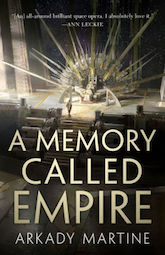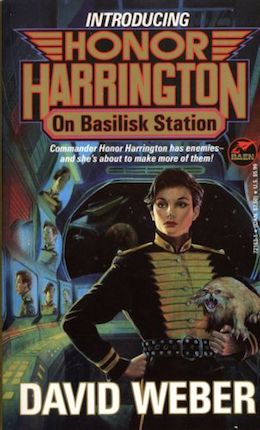In this bi-weekly series reviewing classic science fiction and fantasy books, Alan Brown looks at the front lines and frontiers of the field; books about soldiers and spacers, scientists and engineers, explorers and adventurers. Stories full of what Shakespeare used to refer to as “alarums and excursions”: battles, chases, clashes, and the stuff of excitement.
David Weber is one of today’s most popular military science fiction authors. Fans of this sub-genre like their stories not only full of action, but rich in detail and background information, and that’s what Weber delivers—especially in his Honor Harrington series, which follows a space navy officer clearly inspired by an earlier fictional creation, C. S. Forester’s Horatio Hornblower. The series has been extremely successful, and readers can look forward to spending a long time immersed in this fictional universe, or “Honorverse,” which now spans over thirty novels and story collections.
Horatio Hornblower, the aforementioned creation of author C. S. Forester, is a character who rose through the ranks of the British Navy in its glorious prime, during the Napoleonic Wars of the late 18th and early 19th century. The first three novels, Beat to Quarters, Ship of the Line and Flying Colors, were written immediately before World War II, and centered on Hornblower’s days as a Captain. In the following decades, Forester revisited the character in short stories and novels, and over time, filled in the details of nearly every stage of his naval career. In addition to invigorating the genre of naval adventure stories, Forester’s approach to the character had a definite impact on science fiction, as well. A couple of years ago, when I reviewed some of Poul Anderson’s Captain Sir Dominic Flandry stories (you can read it here), I referred to him as a space-based version of Horatio Hornblower, because Anderson wrote adventures featuring the character at each stage of his military career. In the comments resulting from that review, a number of other characters were also offered as being influenced by Hornblower, including A. Bertram Chandler’s John Grimes, and Star Trek’s James T. Kirk. But one of the clearest heirs to Hornblower is David Weber’s Honor Harrington, a character unabashedly modeled on Forester’s creation.
This is not the first time Honor Harrington has been discussed on Tor.com. On Basilisk Station was reviewed here by Nina Lourie. Liz Bourke discussed Honor in this article on women in military science fiction and reviewed an Honorverse spinoff novel here. And David Weber himself discussed Honor and her motivations here.
Moreover, Honor is not the first female character who saw combat in a science fiction book. One of the first portrayals I remember is David Drake’s Forlorn Hope (which I reviewed here), a book that appeared in 1984, and created a stir because of the way it put women into front-line combat roles. In 1993, when Weber wrote On Basilisk Station, the portrayal of women in science fictional combat was not as rare, but his decision to center an entire series on a female officer was still innovative.
About the Author
David Weber (born 1952) is a prolific author who has written extensively in the genres of science fiction and fantasy. He entered the field through gaming, with his first novel, co-authored with Steve White, set in the Starfire gaming universe. Another early work was Mutineers’ Moon, an entertaining book almost impossible to summarize without spoiling it.
One of Weber’s greatest creations is the “Honorverse,” which now consists of fourteen main novels centered on Honor herself, six Worlds of Honor shared world anthologies, the five-book Crown of Slaves sequence written with Eric Flint, the four-book Saganami Island sequence, the Star Kingdom series, three books written with Jane Lindskold that center on the treecats; and the three-book Manticore Ascendant sequence, written with Timothy Zahn.
Honor Harrington has also been featured in in comics and graphic novels by Image Comics, under their Top Cow imprint. There have also been discussions of possible film or TV incarnations of the character.
Weber is also the author of the Safehold Series, currently up to nine books, which started with Off Armageddon Reef; published by Tor, these books have frequently appeared on The New York Times Best Seller list. For centuries, the planet Safehold repressed industry and science in order to escape the attention of the alien Gbaba, who’ve destroyed all other human colonies. But an android awakens with the goal of changing that status quo, and in doing so, transforms the world of Safehold forever.
A full bibliography of Weber’s works can be found here.
On Basilisk Station is published by Baen Books, who cannily endeavor to entice readers into series fiction by offering early books for free, and you can find the electronic version here.
Navies in Space
One of the most popular settings in science fiction is the space navy ship, a large vessel with a large crew, similar to the destroyers, cruisers, battleships, and carriers that ply the sea today. Major media franchises like Star Trek and Star Wars are full of such vessels, along with many a novel. But the existence of these vessels requires some major leaps in technology to be possible (and some squinting at, if not altogether ignoring, physical laws). If you are going to have immensely large vessels, you are going to need some sort of reactionless drive to power them. If they are going to move at speeds that get them around solar systems quickly, they could easily generate accelerations that would crush their crews, so some sort of artificial gravity is also in order. Then you’ll need some sort of shields to protect them from both energy and projectile weapons, as a ship in space is hideously exposed, and very vulnerable. Existing modern weapons could be scaled up to use in space, but some sort of advanced weapons would be needed to penetrate those shields the enemy is using. And you’ll require some sort of hyperdrive unless your battles are all going to take place in a single star system—a hyperdrive that doesn’t work in close proximity to stars and planets, or attackers will have all of the advantage, and defense would be impossible. You also need either an instantaneous communications device (like an ansible), or you’ll have to do a lot of calculating to figure out how long messages take at the speed of light. And that speed of light issue would affect sensors as well. Plus while everything else gets more advanced, if we want those big crews on board, then we need to be relatively modest about improvements in computing power and robotics.
To summarize, when we tell stories about space navies, we have to do a lot of handwaving to make those scenarios seem possible. We need to admit to ourselves that many of these fictional universes have been reverse engineered to fit the stories we want to tell.
Other space navy stories I have reviewed in the past include the tales of fighter pilots in space found in the Star Wars X-Wing novels (you can find the review here), and the capital ship combat of Jack Campbell’s Lost Fleet series (you can find that review here).
On Basilisk Station
Unlike many military science fiction books, there is no opening battle scene in this novel. Instead, Weber is content to start building this new universe brick by brick. Some readers (including myself) can find his exposition-heavy writing style a bit sluggish, but there are many fans of military fiction who appreciate this approach. And I have to admit, when you do get to the battle scenes, knowing exactly how the propulsion, communications, and weapons systems work, and having the background on key crew members, makes those scenes even richer and more realistic.
Weber presents the leaders of the People’s Republic of Haven as utterly unsympathetic characters, explaining how their sluggish, Soviet-style planned economy could collapse unless fueled by future expansion. They plan to attack the star nation of Manticore, a rich system with three habitable planets and many hyperspace junctions, via their newly annexed system of Basilisk. Then we join Manticore’s Commander Honor Harrington as she takes command of Fearless, only to find that most of its weapons are being removed to make room for a gravity lance: an unstoppable weapon that unfortunately needs to be deployed at what is, in space combat, point-blank range.
Weber then pauses to explain how the impellers that drive these ships create a kind of impenetrable wedge above and below a ship. While shields called sidewalls can be used to protect the ship’s flanks, these are much weaker, creating a situation where ships battle one another with broadsides, comparable to what we would have seen in the Age of Sail. We learn that the Executive Officer wanted the command for himself, which sets him in a conflict with Honor, setting up a scenario similar to what readers might find in a romance plot—a misunderstanding that has you wishing the characters would just talk it out and express their feelings so they can move on.
Honor achieves one initial victory in war games with the lance, but as soon as the other ships figure out what they are facing, her crew has to deal with defeat after defeat. Blaming her for the failure of their weapon system, senior officers soon transfer her ship to the backwater system of Basilisk. The move gives Weber a chance to explain how these ships use a kind of energy sail to catch the currents of hyperspace (another high tech parallel with the Age of Sail). Honor finds that the only other ship in the Basilisk system is commanded by an officer who tried to rape her when she was at the Academy, and is relieved when he finds an excuse to take his ship back to a yard for work. But in doing so he has set her up to fail, as her single ship could easily be overwhelmed by the challenges she now faces.
Buy the Book


A Memory Called Empire
Honor’s primary mission is customs enforcement, and despite the prosaic nature of this task, she takes to it as if she had Coast Guardsman’s blood coursing through her veins. She splits her forces, augmenting the local law enforcement agencies, and putting all her small craft on patrol. And she quickly finds problems. She angers some of the most powerful merchants in Manticore by uncovering illegal activity among their employees. There is a lot of smuggling going on in the system, and not all of it makes economic sense. While the Manticore forces have been trying to leave the native population of the one habitable planet undisturbed, someone is selling them drugs that drive them to uncontrollable rages. Fearless’ crew begins to rise to their huge task, and their successes begin to bring the crew together. They start to realize that the forces of Haven are working against them, and without seeing the whole picture, begin to see signs of the impending invasion.
When they find that someone has been arming the natives, the narrative quickly begins pick up its pace. And all that useful background information that Weber has given us comes into play as they face a ground war to contain a native uprising, and then a fierce space battle. Honor and her crew will have to use every tool at their disposal and work seamlessly as a team if they are even to survive these challenges, let alone overcome them. The book might start slowly, but it builds into a narrative that is hard to put down. (I was reading it while my car was being repaired, and found myself disappointed when the repairs were completed before the book was.)
I had drifted away from following Honor’s adventures sometime in the early 2000s, during a period when I had less time for reading in general, and diminished enthusiasm for reading military science fiction. But this re-read of Honor’s first adventure has whetted my appetite for the character, and I now plan to dig through my old books in order to pick up where I left off.
Final Thoughts
Fans of military science fiction will certainly appreciate what Weber offers in the Honor Harrington series, stories that are full of action and rich in detail; those who don’t delight in exposition might find all that detail oppressive. But the action, which includes some of the most gripping battle scenes I’ve ever read, will be appreciated by all.
And now I’ll shut up, and give you a chance to chime in: If you’ve read them, what do you think of On Basilisk Station, or the other tales set in the Honorverse? And what other fictional space navy stories do you enjoy?
Alan Brown has been a science fiction fan for over five decades, especially fiction that deals with science, military matters, exploration and adventure.











